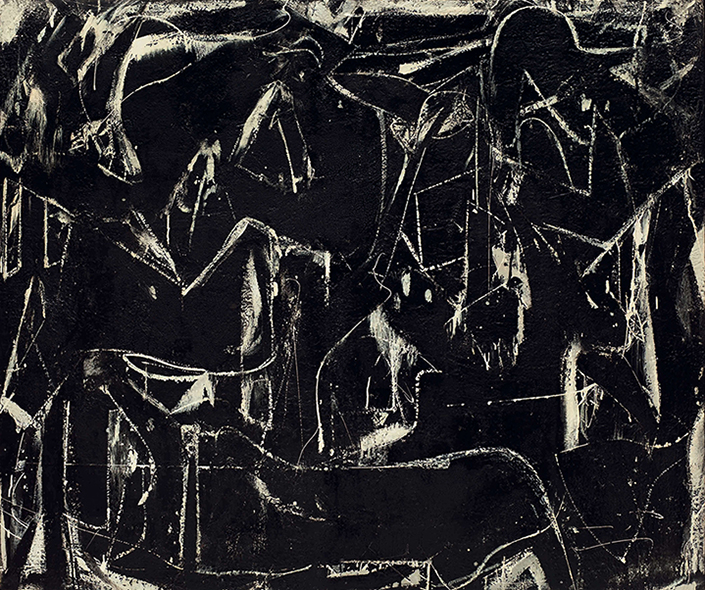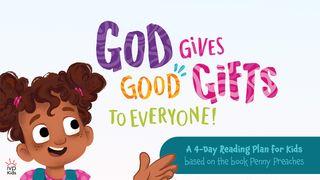Last Words: A Lenten Meditation on the Final Sayings of Christ, Week 5Sample

Why?

Dark Pond , Willem de Kooning, 1948. Enamel on composition board, 46 3/4 x 55 3/4 in.. Frederick R. Weisman Art Foundation, Los Angeles, California. Photograph: Brian Forrest.
“My God, My God Why Have You Forsaken Me” from The Seven Last Words of Christ. Composed by Franz Joseph Haydn. Performed by The Chanticleer Singers.
Poetry:
“The Task”
by Edward Hirsch
You never expected
to spend so many hours
staring down an empty sheet
of lined paper
in the harsh inner light
of an all-night diner,
ruining your heart
over mug after mug
of bitter coffee
and reading Meister Eckhart
or Saint John of the Cross
or some other mystic
of nothingness
in a brightly colored booth
next to a window
looking out
at a deserted off-ramp
or unfinished bridge
or garishly lit parking lot
backing up
on Detroit or Houston
or some other city
forsaken at three a.m.
with loners
and insomniacs
facing the darkness
of an interminable night
that stretched into months
and years.
WHY?
Meditating on this passage from Matthew’s Gospel is a lot like staring at de Kooning’s Dark Pond. There appears to be some way to make sense of what we see, but there’s also too much chaos to really get our heads around it.
In 1948-49, de Kooning made a series of four dark paintings that all had stark black backgrounds playing host to a jumble of undulating lines of white paint. Even though they appear quite simple in composition, the artist embedded some cryptic subtleties within them. The eye cannot help but trace the varying width, velocity, and opacity of his white lines for some explanation to their movement or shape, but none emerges. While critics can find some identifiable shapes in the other works from the series, Dark Pond remains the most mysteriously stoic of the set. Instead of meaning, the abyss stares back.
And yet, the darkened skies around Calvary surely have a double meaning. Naturally, like Haydn’s somber composition, the darkness covering the land attests to the misery and looming grief of the moment. The strange disturbances (quaking ground, splitting rocks, and disturbed graves) also speak to the inconceivable nature of his suffering. Still, however, the symbol of darkness in the biblical imagination is both one of unapproachable mystery and profound presence. So, this metaphysical thinness around Jesus’ last moments bids us to edge closer.
The mystery seems impenetrable, because we have no access to Jesus’ thoughts or feelings besides his screams and the sparse, desperate words they carry. Perhaps, under such excruciating strains, Jesus cannot verbalize his experience beyond the reflex of claiming Psalm 22’s words as his own: “forsaken.”
Trying to discern exactly what Jesus experiences here, especially in this moment of acutest pain, is certainly impossible for us. Our feeble approximations may not get closer than how Edward Hirsch concludes his poem: “facing the darkness/ of an interminable night/ that stretched into months/ and years.” The sting of utter meaninglessness seems paralyzingly close for him. “Why?” feels like a swirling black hole of doubt and crippling uncertainty, and Jesus did not spare himself from it.
While we may never fully measure the depths of his agony, we must avoid the responses of those present. Either in desperation to end his sufferings or ignorant enjoyment of the tragedy, these remind us how much humanity wants to look away from his sacrifice. As C.S. Lewis explained of Christ’s temptations in Mere Christianity, humans don’t have the fortitude to even consider how much Jesus could actually suffer. We cannot comprehend it. Only the Son of God could face this end.
So, the only proper response is to marvel at his incredible power to love. And never doubt that Christ has power over any kind of seemingly meaningless suffering we’re facing because he has already endured the worst forsakenness for us. In love, he has ensured that we will never suffer alone.
Prayer:
Heavenly Father, give us eyes to see and minds to comprehend more fully the depth of love Christ poured out for us on his cross. Bind us to Jesus, so that we might honor his life, death, and resurrection by following him more closely. Give us grace to quiet our fears and question our doubts when we face trials of our own. Let us instead find a deeper joy through fellowship with his sufferings. We ask it in the name of the Father, the Son, and the Spirit.
Amen.
Dr. Taylor Worley
Visiting Associate Professor of Art History
Wheaton College
Wheaton, Illinois
Scripture
About this Plan

The Lent Project is an initiative of Biola University's Center for Christianity, Culture and the Arts. Each daily devotion includes a portion of Scripture, a devotional, a prayer, a work of visual art or a video, a piece of music, and a poem plus brief commentaries on the artworks and artists. The Seven Last Words of Christ refers to the seven short phrases uttered by Jesus on the cross, as gathered from the four Christian gospels. This devotional project connects word, image, voice and song into daily meditations on these words.
More
We would like to thank Biola University for providing this plan. For more information, please visit: https://ccca.biola.edu/lent/2025
Related Plans

Cornerstone: Rebuild, Renew, Restore

Jesus Never Said ‘Hustle’: Finding True Rest in a Burnout World

Adventure in Evangelism

God Gives Good Gifts to Everyone

Not Giving Into Fear and Peer Pressure: Devotions for Girls (I Am Fearless)

Who Is Jesus?

Ways to Overcome Your Fears: Devotions for Girls (I Am Fearless)

Forgive Them Too??

Fearless & Free: Overcoming Fear With Faith a 5-Day Plan With Kelly Roberson
